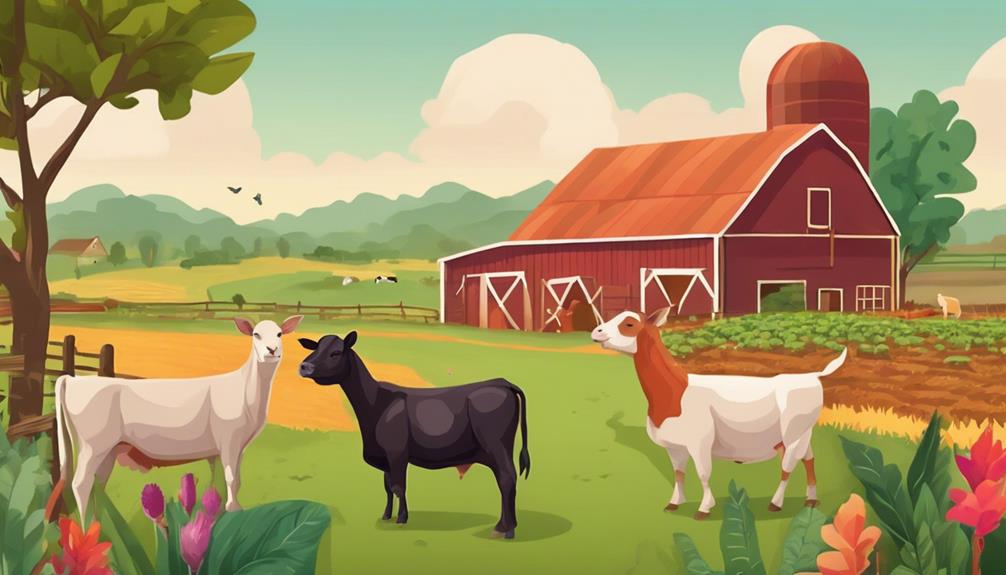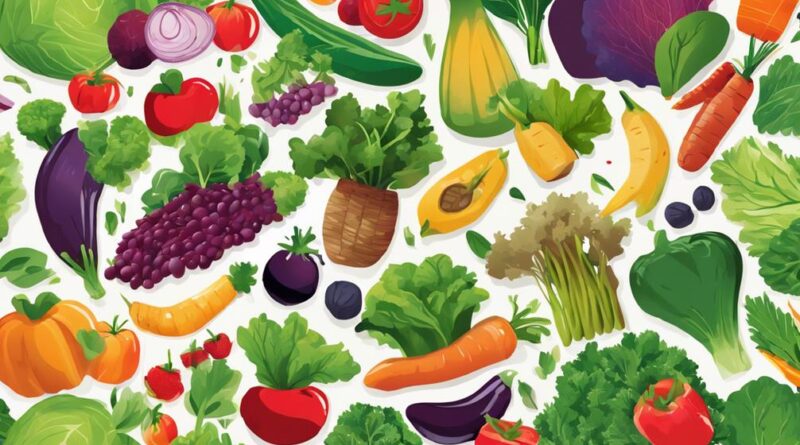How Vegans Benefit From Naturally Grown Foods
When you choose naturally grown foods as part of your vegan diet, you boost your nutrient intake and back sustainable farming practices. Seasonal, organic produce packs essential vitamins and fewer pesticides. Opting for pesticide-free options aids long-term health, while also reducing your carbon footprint. Promoting animal welfare and clean eating practices, organic choices are more nutrient-dense and lower health risks. Supporting organic farming benefits not only your health but the environment too. Enjoy enhanced flavors while nourishing your body and the planet. Learn more about how vegans benefit from naturally grown foods by exploring further.
Nutrient-Rich Options for Vegans
When following a vegan diet, incorporating naturally grown foods can provide a wide range of nutrient-rich options for optimal health and well-being. Seasonal variety plays a crucial role in ensuring that vegans have access to a diverse array of nutrients throughout the year. Fruits and vegetables that are in season aren't only fresher and taste better but also contain higher levels of essential vitamins, minerals, and antioxidants. By consuming a variety of seasonal produce, vegans can ensure they're meeting their nutritional needs while enjoying the flavors of each season.
Organic benefits are another key aspect of naturally grown foods for vegans. Choosing organic options can reduce exposure to pesticides, genetically modified organisms (GMOs), and synthetic fertilizers. Organic farming practices focus on maintaining soil health, promoting biodiversity, and avoiding the use of harmful chemicals. For vegans, organic foods offer a cleaner and more sustainable choice that aligns with their ethical and environmental values. Additionally, organic produce has been found to have higher levels of certain nutrients, such as antioxidants, compared to conventionally grown counterparts.
Incorporating a variety of nutrient-rich, naturally grown foods into your vegan diet can help support overall health and well-being. By prioritizing seasonal variety and organic options, you can maximize the nutritional benefits of your food choices while minimizing exposure to harmful substances. Remember to explore local farmer's markets, community-supported agriculture (CSA) programs, and organic grocers to access a wide selection of high-quality, plant-based foods.
Pesticide-Free Eating for Vegans
To maintain a pesticide-free vegan diet, prioritizing organic and naturally grown foods is key for reducing exposure to harmful chemicals and supporting overall health and well-being. Organic certification ensures that foods are grown without synthetic pesticides, herbicides, and genetically modified organisms, making them a safer choice for vegans seeking to minimize their intake of toxic substances. By choosing organic produce, vegans can reap numerous health benefits.
Studies have shown that organic foods contain higher levels of essential nutrients such as vitamins, minerals, and antioxidants compared to conventionally grown produce. These nutrients are essential for maintaining a balanced diet and supporting overall health. Additionally, organic farming practices promote soil health and biodiversity, which further enhances the nutritional quality of the food.
Choosing organic and naturally grown foods also reduces the risk of pesticide exposure, which has been linked to various health issues including cancer, hormone disruption, and neurological problems. By opting for pesticide-free options, vegans can lower their overall pesticide burden and support their long-term health and well-being.
Environmentally Friendly Vegan Choices
Choosing environmentally friendly vegan options not only benefits your health but also contributes to sustainable practices that support the planet's well-being. By opting for ethical sourcing and eco-conscious living, you're making a positive impact on the environment and promoting a more sustainable future. Here are five key points to consider:
- Reduced Carbon Footprint: Vegan choices often require fewer resources and emit fewer greenhouse gases, helping combat climate change.
- Preservation of Biodiversity: By supporting plant-based diets, you contribute to the conservation of diverse ecosystems and protect endangered species.
- Water Conservation: Vegan options generally require less water for production compared to animal-based products, aiding in the conservation of this precious resource.
- Minimized Pollution: Plant-based diets result in lower pollution levels in air, water, and soil, promoting cleaner environments.
- Support for Sustainable Agriculture: Choosing vegan foods encourages farmers to adopt more sustainable farming practices, benefiting both the planet and future generations.
Embracing environmentally friendly vegan choices aligns with principles of ethical sourcing and eco-conscious living. Your decisions can have a ripple effect, influencing others to make more sustainable choices and collectively working towards a healthier planet.
Supporting Sustainable Farming Practices
Supporting sustainable farming practices plays a crucial role in enhancing agricultural resilience and promoting long-term environmental sustainability. Organic farming, which is a key component of sustainable agriculture, focuses on utilizing natural processes and resources. By avoiding synthetic pesticides, herbicides, and fertilizers, organic farming reduces environmental pollution, protects biodiversity, and promotes soil health.
Eco-friendly practices within sustainable farming include crop rotation, cover cropping, and the use of natural compost. Crop rotation helps maintain soil fertility and reduces the risk of pests and diseases, while cover cropping minimizes soil erosion and improves water retention. Natural compost enriches the soil with essential nutrients, promoting plant growth without the need for chemical additives.
In addition to benefiting the environment, sustainable farming practices also have positive impacts on human health. By reducing exposure to harmful chemicals present in conventional farming, organic produce offers consumers a healthier alternative. The absence of synthetic additives in organic foods decreases the risk of pesticide residue consumption, which has been linked to various health issues.
Supporting sustainable farming practices not only aligns with vegan principles but also contributes to building a more sustainable food system for the future. By choosing organic, eco-friendly products, you support responsible agricultural methods that prioritize environmental preservation and human well-being.
Reduced Exposure to Harmful Chemicals
Reducing exposure to harmful chemicals is essential for maintaining optimal health and well-being in individuals following a vegan diet. When you choose naturally grown foods from organic farming, you're prioritizing clean eating practices that can benefit your overall health.
Here are some key points to consider:
- Organic farming practices: Opting for organic foods means choosing produce grown without synthetic pesticides, herbicides, or genetically modified organisms, reducing your exposure to harmful chemicals commonly found in conventionally grown crops.
- Nutrient density: Naturally grown foods tend to be more nutrient-dense since they're cultivated in nutrient-rich soil without the interference of synthetic chemicals, ensuring that you receive a higher concentration of essential vitamins and minerals.
- Reduced health risks: By consuming foods produced through organic farming methods, you lower your risk of potential health issues associated with pesticide exposure, such as hormone disruption, neurodevelopmental problems, and certain types of cancer.
- Environmental impact: Supporting organic farming practices also benefits the environment by promoting biodiversity, reducing soil and water contamination, and supporting sustainable agriculture methods that preserve natural ecosystems.
- Promoting clean eating: Choosing naturally grown foods aligns with the principles of clean eating, emphasizing whole, minimally processed foods that are free from artificial additives and pesticides, ultimately contributing to your overall well-being.
Enhanced Flavor Profiles for Vegans
Enhancing the flavor profiles of your vegan dishes can elevate your culinary experience and introduce a new dimension to your plant-based meals. As a vegan, you may have unique taste preferences that can be satisfied through the diversity of naturally grown foods. The use of fresh, organic ingredients in your cooking not only enhances the taste of your dishes but also provides a more wholesome and satisfying experience for your palate.
Exploring different herbs, spices, and vegetables can add depth and complexity to your meals, allowing you to create a wide range of flavorful dishes. By opting for naturally grown foods, you can enjoy the pure and authentic taste of each ingredient, enhancing the overall quality of your culinary creations. This can lead to a greater appreciation for the natural flavors of plant-based foods and a more enjoyable dining experience.
Moreover, experimenting with a variety of cooking techniques, such as roasting, grilling, or sautéing, can further enhance the flavor profiles of your vegan dishes. These culinary experiences not only cater to your taste preferences but also allow you to expand your cooking skills and creativity in the kitchen. By incorporating naturally grown foods into your recipes, you can unlock a world of delicious possibilities and truly savor the joys of plant-based eating.
Promoting Animal Welfare Through Organic Choices

To align with your vegan lifestyle and extend your commitment to ethical choices, consider how opting for organic, naturally grown foods can contribute to promoting animal welfare. Choosing organic options not only benefits your plant-based diet but also supports ethical sourcing practices that prioritize animal welfare. Here are some key points to consider:
- Cruelty-Free Practices: Organic farming methods often involve higher animal welfare standards, reducing the use of antibiotics and hormones commonly found in non-organic animal farming.
- Biodiversity Preservation: By supporting organic agriculture, you're promoting ecosystems where animals can thrive naturally, without the negative impacts of intensive farming practices.
- Reduced Environmental Impact: Organic farming practices focus on sustainability, reducing pollution and habitat destruction that can harm wildlife and disrupt animal habitats.
- Healthier Animals: Organic standards emphasize providing animals with better living conditions and natural diets, leading to healthier and happier livestock.
- Transparency and Traceability: Choosing organic foods provides transparency in the sourcing process, allowing you to make informed decisions that align with your values regarding animal welfare.
Access to Fresh, Locally Sourced Produce
When seeking optimal nutrition and supporting local farmers, accessing fresh, locally sourced produce is essential for maintaining a well-rounded vegan diet. By engaging in community supported agriculture (CSA) programs, vegans can directly connect with nearby farms, receiving a regular supply of seasonal fruits and vegetables. These programs not only ensure a steady source of fresh produce but also foster a sense of community and support for local agriculture.
Participating in CSA initiatives allows you to enjoy a variety of in-season fruits and vegetables, which are harvested at their peak of freshness and flavor. Seasonal eating not only provides you with the most nutrient-dense options but also reduces the carbon footprint associated with transporting out-of-season produce long distances. By consuming locally grown foods, you support sustainable agricultural practices and minimize the environmental impact of your diet.
Additionally, accessing fresh, locally sourced produce can introduce you to new and diverse ingredients, inspiring creativity in your plant-based cooking. The vibrant colors, flavors, and textures of seasonal fruits and vegetables can enhance the enjoyment of your meals and broaden the nutritional profile of your vegan diet. Embracing locally sourced produce not only benefits your health but also contributes to the vitality of your community and the preservation of agricultural traditions.
Conclusion
In conclusion, by choosing naturally grown foods, vegans can benefit from nutrient-rich options, pesticide-free eating, and environmentally friendly choices. Supporting sustainable farming practices not only reduces exposure to harmful chemicals but also enhances flavor profiles.
By promoting animal welfare through organic choices and accessing fresh, locally sourced produce, vegans can make a positive impact on their health, the environment, and the well-being of animals.
Make the switch to naturally grown foods for a healthier and more sustainable vegan lifestyle.
